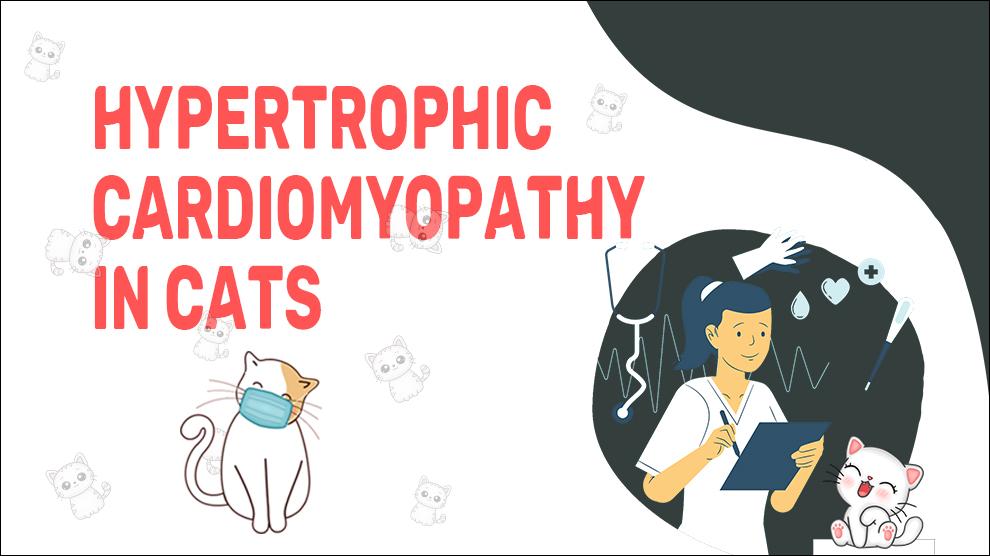What Is Hypertrophic Cardiomyopathy In Cats?
Hypertrophic Cardiomyopathy in cats occurs when the muscles in the heart become thick and stiff.
This can lead to a range of symptoms, including difficulty breathing, lethargy, and sudden collapse. The condition can be caused by a range of factors, including genetics and underlying health conditions.
Treatment options may include medication and lifestyle changes, and early detection is key to improving the cat's prognosis.
Clinical Signs Of Hypertrophic Cardiomyopathy In Cats
The symptoms of Hypertrophic Cardiomyopathy in cats can vary depending on the severity of the condition.
Some common symptoms include:
- Difficulty breathing or rapid breathing
- Lethargy or weakness
- Reduced appetite or weight loss
- Fainting or sudden collapse
- Coughing
- Heart murmur
- Abnormal heart rate or rhythm
- Swelling in the legs or abdomen
- Lack Of Appetite
- Weak Pulse Rate
- Exercise Intolerance
- Paralysis Of The Hind Legs
- Irregular Heart Beat
- Pale Gums
- Bluish Gums
Treatment Options For Hypertrophic Cardiomyopathy In Cats
Treatment for Hypertrophic Cardiomyopathy in cats may vary depending on the severity of the condition.
Some common treatments include:
- Medications - Medications such as beta-blockers, calcium channel blockers, and ACE inhibitors may be prescribed to help regulate the cat's heart rate and reduce the risk of complications.
- Lifestyle changes - Making changes to the cat's diet, exercise routine, and overall lifestyle can help improve their overall health and reduce the risk of complications.
- Surgery - In severe cases, surgery may be required to remove excess tissue from the heart or repair damaged valves.
- Regular check-ups - Regular visits to the vet for check-ups and monitoring of the cat's condition is important for managing the condition and catching any potential complications early on.
Home Remedies For Hypertrophic Cardiomyopathy In Cats
There are no known home remedies for treating HCM. However, owners can take certain steps to manage the symptoms and improve their cat's quality of life.
These include maintaining a healthy weight, providing a low-stress environment, and administering any prescribed medications as directed by a veterinarian.
How To Prevent Hypertrophic Cardiomyopathy In Cats?
While there is no surefire way to prevent Hypertrophic Cardiomyopathy in cats, there are some steps that cat owners can take to reduce the risk of the condition.
These include:
- Regular check-ups - Regular visits to the vet for check-ups and monitoring of the cat's overall health can help identify any potential issues early on.
- Healthy lifestyle - Maintaining a healthy diet and exercise routine can help reduce the risk of obesity and other underlying health conditions that may increase the risk of Hypertrophic Cardiomyopathy.
- Breed screening - If you are considering getting a cat, it may be worth looking into the breed's predisposition to Hypertrophic Cardiomyopathy and other health conditions.
Affected Cat Breeds Of Hypertrophic Cardiomyopathy
While Hypertrophic Cardiomyopathy (HCM) can affect any breed of cat, certain breeds appear to be at a higher risk. These include Maine Coon, Ragdoll, British Shorthair, and Sphynx cats.
Causes For Hypertrophic Cardiomyopathy In Cats
Causes:
The exact causes of Hypertrophic Cardiomyopathy in cats are not fully understood, but it is believed that both genetic and environmental factors may play a role.
Some breeds, such as the Maine Coon and Ragdoll, are more predisposed to developing the condition. Other risk factors may include age, obesity, high blood pressure, and thyroid disease.
When To See A Vet For Hypertrophic Cardiomyopathy In Cats?
If you notice any of the symptoms of Hypertrophic Cardiomyopathy in your cat, it is important to seek veterinary care as soon as possible.
Early detection and treatment can improve the cat's prognosis and reduce the risk of complications.
Food Suggestions For Hypertrophic Cardiomyopathy In Cats
Since obesity is a risk factor for HCM, it's important to ensure that your cat maintains a healthy weight.
This can be achieved by providing a balanced and appropriate diet that meets their nutritional needs without overfeeding.
High-quality commercial cat food that is appropriate for your cat's age, health, and lifestyle is typically the best option.
Some veterinarians may recommend a special diet for cats with HCM, such as a low-sodium or low-fat diet.
Conclusion
Hypertrophic Cardiomyopathy is a serious condition that can lead to severe health problems and even death if left untreated.
However, with proper diagnosis and management, many cats with HCM can live long and healthy lives.
Owners should be aware of the symptoms of HCM and seek veterinary care immediately if they notice any signs of heart disease in their cats.
By working closely with a veterinarian and providing appropriate care, owners can help their cats manage this condition and enjoy a good quality of life.











